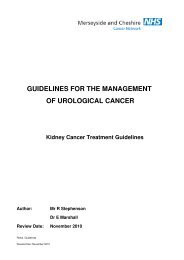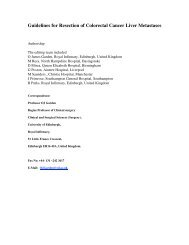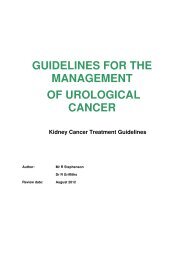Cancer Reform Strategy - NHS Cancer Screening Programmes
Cancer Reform Strategy - NHS Cancer Screening Programmes
Cancer Reform Strategy - NHS Cancer Screening Programmes
- No tags were found...
You also want an ePaper? Increase the reach of your titles
YUMPU automatically turns print PDFs into web optimized ePapers that Google loves.
CHAPTER 4: ENSURING BETTER TREATMENT 674.65 The groups who met to discuss their 2012visions for particular cancers and groups ofcancers made predictions about how cancertreatment will change. Some of these are setout below.Box 14: Breast cancer●●More new drugs available for early and advanced disease; andMore surgeons will have been trained in oncoplastic techniques.Box 15: Colorectal cancer●●●●Surgery will remain the mainstay of treatment for most patients, but laparoscopic surgerywill be becoming the norm at least for elective surgery for colon cancer in combination withEnhanced Recovery <strong>Programmes</strong>;Novel techniques (such as transanal excisional microsurgery – TEMS) will be available inmajor centres for highly selected groups of patients;Increase in preoperative radiotherapy and Image-Guided Radiotherapy; andChemotherapeutic agents will be more widely used in the adjuvant setting.Box 16: Lung cancer●●Treatment will be more complex (such as parenchymal – sparing surgery, combinationchemo-radiotherapy, biological therapies etc); andNew, less toxic, drugs are likely to be available and methods are likely to become available tobetter individualise therapy.Box 17: Urological cancersProstate●●●●The ProtecT trial will have reported its early findings, informing a clinical consensus on themost appropriate treatment options for localised prostate cancer;The use of laparoscopic and robotic surgery, brachytherapy and active surveillance willcontinue to increase;More evidence will be available on newer treatments, such as HIFU and Cryotherapy; andFor more advanced disease, there will be more chemotherapy, more radiotherapy, newhormonal treatments and novel approaches.Other urological●●Increased use of laparoscopic surgery, as well as techniques such as radiofrequency ablation,cryotherapy and high intensity ultrasound; andMore targeted therapies and more evidence to support concurrent chemotherapy andradiotherapy.
















